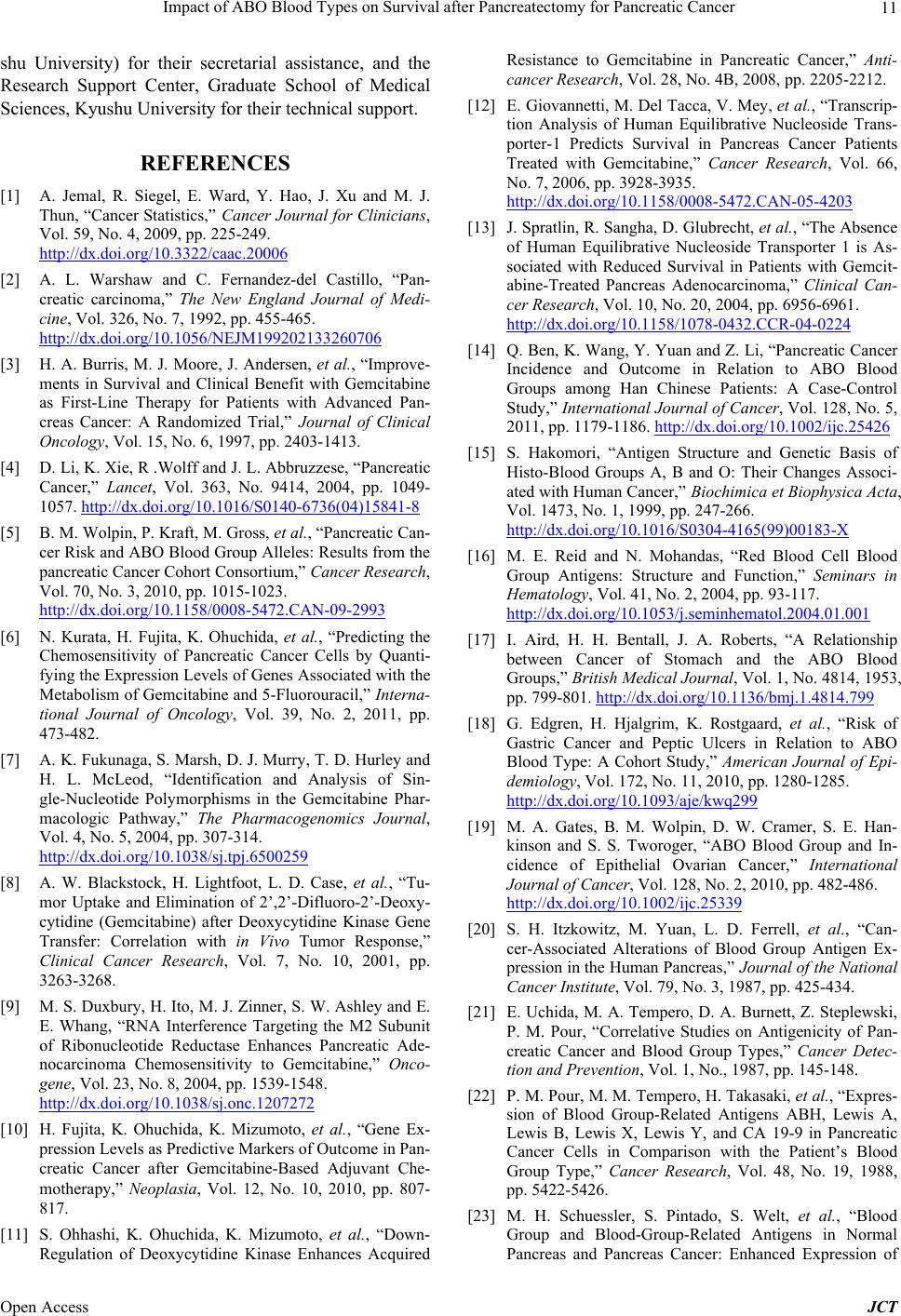
Impact of ABO Blood Types on Survival after Pancreatectomy for Pancreatic Cancer 11
shu University) for their secretarial assistance, and the
Research Support Center, Graduate School of Medical
Sciences, Kyushu University for their technical support.
REFERENCES
[1] A. Jemal, R. Siegel, E. Ward, Y. Hao, J. Xu and M. J.
Thun, “Cancer Statistics,” Cancer Journal for Clinicians,
Vol. 59, No. 4, 2009, pp. 225-249.
http://dx.doi.org/10.3322/caac.20006
[2] A. L. Warshaw and C. Fernandez-del Castillo, “Pan-
creatic carcinoma,” The New England Journal of Medi-
cine, Vol. 326, No. 7, 1992, pp. 455-465.
http://dx.doi.org/10.1056/NEJM199202133260706
[3] H. A. Burris, M. J. Moore, J. Andersen, et al., “Improve-
ments in Survival and Clinical Benefit with Gemcitabine
as First-Line Therapy for Patients with Advanced Pan-
creas Cancer: A Randomized Trial,” Journal of Clinical
Oncology, Vol. 15, No. 6, 1997, pp. 2403-1413.
[4] D. Li, K. Xie, R .Wolff and J. L. Abbruzzese, “Pancreatic
Cancer,” Lancet, Vol. 363, No. 9414, 2004, pp. 1049-
1057. http://dx.doi.org/10.1016/S0140-6736(04)15841-8
[5] B. M. Wolpin, P. Kraft, M. Gross, et al., “Pancreatic Can-
cer Risk and ABO Blood Group Alleles: Results from the
pancreatic Cancer Cohort Consortium,” Cancer Research,
Vol. 70, No. 3, 2010, pp. 1015-1023.
http://dx.doi.org/10.1158/0008-5472.CAN-09-2993
[6] N. Kurata, H. Fujita, K. Ohuchida, et al., “Predicting the
Chemosensitivity of Pancreatic Cancer Cells by Quanti-
fying the Expression Levels of Genes Associated with the
Metabolism of Gemcitabine and 5-Fluorouracil,” Interna-
tional Journal of Oncology, Vol. 39, No. 2, 2011, pp.
473-482.
[7] A. K. Fukunaga, S. Marsh, D. J. Murry, T. D. Hurley and
H. L. McLeod, “Identification and Analysis of Sin-
gle-Nucleotide Polymorphisms in the Gemcitabine Phar-
macologic Pathway,” The Pharmacogenomics Journal,
Vol. 4, No. 5, 2004, pp. 307-314.
http://dx.doi.org/10.1038/sj.tpj.6500259
[8] A. W. Blackstock, H. Lightfoot, L. D. Case, et al., “Tu-
mor Uptake and Elimination of 2’,2’-Difluoro-2’-Deoxy-
cytidine (Gemcitabine) after Deoxycytidine Kinase Gene
Transfer: Correlation with in Vivo Tumor Response,”
Clinical Cancer Research, Vol. 7, No. 10, 2001, pp.
3263-3268.
[9] M. S. Duxbury, H. Ito, M. J. Zinner, S. W. Ashley and E.
E. Whang, “RNA Interference Targeting the M2 Subunit
of Ribonucleotide Reductase Enhances Pancreatic Ade-
nocarcinoma Chemosensitivity to Gemcitabine,” Onco-
gene, Vol. 23, No. 8, 2004, pp. 1539-1548.
http://dx.doi.org/10.1038/sj.onc.1207272
[10] H. Fujita, K. Ohuchida, K. Mizumoto, et al., “Gene Ex-
pression Levels as Predictive Markers of Outcome in Pan-
creatic Cancer after Gemcitabine-Based Adjuvant Che-
motherapy,” Neoplasia, Vol. 12, No. 10, 2010, pp. 807-
817.
[11] S. Ohhashi, K. Ohuchida, K. Mizumoto, et al., “Down-
Regulation of Deoxycytidine Kinase Enhances Acquired
Resistance to Gemcitabine in Pancreatic Cancer,” Anti-
cancer Research, Vol. 28, No. 4B, 2008, pp. 2205-2212.
[12] E. Giovannetti, M. Del Tacca, V. Mey, et al., “Transcrip-
tion Analysis of Human Equilibrative Nucleoside Trans-
porter-1 Predicts Survival in Pancreas Cancer Patients
Treated with Gemcitabine,” Cancer Research, Vol. 66,
No. 7, 2006, pp. 3928-3935.
http://dx.doi.org/10.1158/0008-5472.CAN-05-4203
[13] J. Spratlin, R. Sangha, D. Glubrecht, et al., “The Absence
of Human Equilibrative Nucleoside Transporter 1 is As-
sociated with Reduced Survival in Patients with Gemcit-
abine-Treated Pancreas Adenocarcinoma,” Clinical Can-
cer Research, Vol. 10, No. 20, 2004, pp. 6956-6961.
http://dx.doi.org/10.1158/1078-0432.CCR-04-0224
[14] Q. Ben, K. Wang, Y. Yuan and Z. Li, “Pancreatic Cancer
Incidence and Outcome in Relation to ABO Blood
Groups among Han Chinese Patients: A Case-Control
Study,” International Journal of Cancer, Vol. 128, No. 5,
2011, pp. 1179-1186. http://dx.doi.org/10.1002/ijc.25426
[15] S. Hakomori, “Antigen Structure and Genetic Basis of
Histo-Blood Groups A, B and O: Their Changes Associ-
ated with Human Cancer,” Biochimica et Biophysica Acta,
Vol. 1473, No. 1, 1999, pp. 247-266.
http://dx.doi.org/10.1016/S0304-4165(99)00183-X
[16] M. E. Reid and N. Mohandas, “Red Blood Cell Blood
Group Antigens: Structure and Function,” Seminars in
Hematology, Vol. 41, No. 2, 2004, pp. 93-117.
http://dx.doi.org/10.1053/j.seminhematol.2004.01.001
[17] I. Aird, H. H. Bentall, J. A. Roberts, “A Relationship
between Cancer of Stomach and the ABO Blood
Groups,” British Medical Journal, Vol. 1, No. 4814, 1953,
pp. 799-801. http://dx.doi.org/10.1136/bmj.1.4814.799
[18] G. Edgren, H. Hjalgrim, K. Rostgaard, et al., “Risk of
Gastric Cancer and Peptic Ulcers in Relation to ABO
Blood Type: A Cohort Study,” American Journal of Epi-
demiology, Vol. 172, No. 11, 2010, pp. 1280-1285.
http://dx.doi.org/10.1093/aje/kwq299
[19] M. A. Gates, B. M. Wolpin, D. W. Cramer, S. E. Han-
kinson and S. S. Tworoger, “ABO Blood Group and In-
cidence of Epithelial Ovarian Cancer,” International
Journal of Cancer, Vol. 128, No. 2, 2010, pp. 482-486.
http://dx.doi.org/10.1002/ijc.25339
[20] S. H. Itzkowitz, M. Yuan, L. D. Ferrell, et al., “Can-
cer-Associated Alterations of Blood Group Antigen Ex-
pression in the Human Pancreas,” Journal of the National
Cancer Institute, Vol. 79, No. 3, 1987, pp. 425-434.
[21] E. Uchida, M. A. Tempero, D. A. Burnett, Z. Steplewski,
P. M. Pour, “Correlative Studies on Antigenicity of Pan-
creatic Cancer and Blood Group Types,” Cancer Detec-
tion and Prevention, Vol. 1, No., 1987, pp. 145-148.
[22] P. M. Pour, M. M. Tempero, H. Takasa ki, et al., “Expres-
sion of Blood Group-Related Antigens ABH, Lewis A,
Lewis B, Lewis X, Lewis Y, and CA 19-9 in Pancreatic
Cancer Cells in Comparison with the Patient’s Blood
Group Type,” Cancer Research, Vol. 48, No. 19, 1988,
pp. 5422-5426.
[23] M. H. Schuessler, S. Pintado, S. Welt, et al., “Blood
Group and Blood-Group-Related Antigens in Normal
Pancreas and Pancreas Cancer: Enhanced Expression of
Open Access JCT